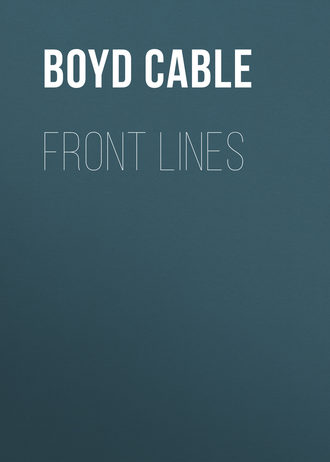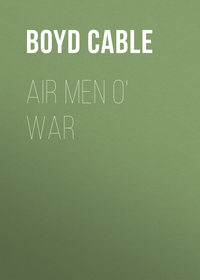
Front Lines
Once he ran back to the office to find the Colonel standing there. “Hullo, Vickers,” he said cheerfully. “Doing a roaring trade to-night, aren’t you?”
“I just am, sir,” said Vickers, wiping his wet forehead. “I’ll be out of Beer-Ex4 presently if they keep on rushing me for it at this rate.”
“Noisy brute of a gun that,” said the Colonel, as a heavy piece behind them crashed sharply, and the shell roared away overhead in diminishing howls and moans.
“And here’s one coming the wrong way,” said Vickers hurriedly. “Hope they’re not going to start pitching ’em in here again.”
But his hopes were disappointed. The German gun or guns commenced another regular bombardment of and round the dump. Shell after shell whooped over, and dropped with heavy rolling c-r-r-umps on the ground, dangerously near to the piled boxes. Then one fell fairly on top of a pile of shells with an appalling crash and rending, splintering clatter, a spouting gush of evil-smelling black smoke, and clouds of blinding dust. The pile hit was flung helter-skelter, the boxes crashing and shattering as they fell and struck heavily on the ground, the loose shells whirling up and out from the explosion, and thumping and thudding on the other piles or in the dust.
At first sound of the burst, or, in fact, a second or so before it, the dump officer was yelling at the pitch of his voice, over and over again, “Gas masks on – gas masks on”; and before the ripping and splintering crashes had well finished he was running hard to the spot where the shell had fallen. He freed his own mask as he ran, and slipped it over his face, but even before he had pushed into the drifting reek of the burst he had snatched it off, and was turning back, when he found the Colonel on his heels.
“I was afraid of those gas-shells of ours, sir,” he said hurriedly. “Pretty near ’em, but they’re all right, and nothing’s afire, evidently.”
“Good enough,” said the Colonel quietly. “Better hurry the men at the job again.”
“Masks off,” shouted Vickers. “All right here. Masks off, and get on with it, men.”
The working party and the drivers snatched their masks off, and before the dust of the explosion had settled were hard at work again. But the shells began to fall with alarming regularity and in dangerous proximity to the dump and road outside. The Colonel moved over to the office, and found Vickers there gripping a notebook, a handful of papers under his arm, and talking into the telephone. He broke off his talk at sight of the Colonel.
“One moment. Here he is now. Hold the wire.” He held the receiver out. “Will you speak to Divisional H.Q., sir? They’re asking about the shelling here.”
The Colonel took the ’phone and spoke quietly into it. Another shell dropped with a rending crash somewhere outside, and Vickers jumped for the door and vanished. The piled boxes of the “office” walls shivered and rocked, and dust rained down on the paper-strewn table. But the Colonel went on talking, telling what the shelling was like and how heavy it was, the number of waggons waiting, and so on.
He was putting the ’phone down as Vickers entered hurriedly and reported, “Just outside in the road, sir. Did in a waggon and team and two drivers.”
“We’ve got to carry on as long as we can, Vickers,” said the Colonel. “The stuff is urgently wanted up there, and we’d lose a lot of time to clear the teams out and bring them back.”
“Very good, sir,” said Vickers, and vanished again.
The shelling continued. Most of the shells fell close to, but clear of, the dump, but another hit a pile of shells, exploding none, but setting a few splintered boxes on fire. The fire, fortunately, was smothered in a moment. Another burst just at the entrance to the curved road through the dump, smashing an ammunition waggon to a wreck of splintered woodwork and twisted iron, blowing two teams to pieces, and killing and wounding half a dozen men. There was a moment’s confusion, a swirl of plunging horses, a squealing of braked wheels, a shouting and calling and cursing. But as the smoke and dust cleared the confusion died away, and in five minutes the wrecked waggon and dead animals were dragged clear, and the work was in full swing again. Vickers, moving amongst the teams, heard two drivers arguing noisily. “What did I tell you?” one was shouting. “What did I tell you! Didn’t I say mules would stand shell-fire good as any hosses? Here’s my pair never winked an eye.”
“Winked a eye!” said the other scornfully. “They tried to do a obstacle race over my waggon. An’ they kicked sufferin’ Saul outer your centres an’ each other. Yer off-lead’s near kicked the hin’ leg off’n his mate, anyway.”
“Kicked?” said the first, and then stopped as his eye caught the red gleam of flowing blood. “Strewth, he’s wounded. My bloomin’ donkey’s casualtied. Whoa, Neddy; stan’ till I see what’s wrong. You’ll get a bloomin’ wound stripe to wear for this, Neddy. Whoa, you – ”
Vickers, remembering the snatch of talk, was able to tell the Colonel a moment later, “No, sir; the men don’t seem rattled a mite; and they’re working like good ’uns.”
The shelling continued, but so did the work. The waggons continued to roll in, to fill up, and pull out again; the pile of ammunition boxes to dwindle, the heap of empty boxes to grow. Vickers scurried round, keeping an eye on smooth working, trying at intervals to press some of his stock of gas-shells on any battery that would take them. “I’ve fair got wind up about them,” he confided to one waggon-line officer. “If a shell hits them it will stop the whole blessed dump working. Then where will your guns be for shell?”
The shelling continued, and caught some more casualties. Vickers superintended their removal, wiped his hands on his breeches, and went back to his office and his “returns” and the worry of trying to account for the shells scattered by the enemy shell in his dump. The men worked on doggedly. The gun-line wanted shells, and the gun-line would get them – unless or until the dump blew up.
The shelling continued – although, to be sure, it eased off at intervals – until dawn; but by that time the last loaded waggon had departed and the dump was almost empty of shells. The German gunners were beaten and the dump had won. Presently the German line would feel the weight of the dump’s work.
Three hours later, after a final struggle with his “returns,” Vickers, dirty and dusty, grimed with smoke and ash, a stubble of beard on his chin and tired rings under his eyes, trudged to the mess dug-out for breakfast and tea – tea, hot tea, especially. He met the Colonel, and recounted briefly the various thousands of assorted shells – high explosive, shrapnel, lyddite, and so on – he had sent up to the gun-line during the night. He also recounted sorrowfully the night’s casualties amongst his dump party, and spoke with a little catch in his voice of his dead sergeant, “the best N.C.O. he’d ever known.”
“A good night’s work well done, Vickers,” said the Colonel quietly.
“A roaring trade, sir, as you said,” answered Vickers, with a thin smile. “And hark at ’em up there now,” and he nodded his head towards the distant gun-line. They stood a moment in the sunshine at the top of the dug-out steps. Round them the heavies still thundered and crashed and cracked savagely, and from the gun line where the field guns worked the roar of sound came rolling and throbbing fiercely and continuously.
“They’ll pay back for what you got last night,” said the Colonel, “and some of them wouldn’t be able to do it but for your work last night.”
The ground under them trembled to the blast of a near-by heavy battery, the air vibrated again to the furious drumming fire that thundered back from the front lines.
“That’s some consolation,” said Vickers, “for my sergeant. Small profit and quick returns to their shells; the right sort of motto, that, for a roaring trade.”
The fire of the gun-line, rising to a fresh spasm of fury, fairly drowned the last of his words. “A proper roaring trade,” he repeated loudly, and nodded his head again in the direction of the sound.
XII
HOME
If anybody had told Lieutenant “Lollie” Dutford, Lieutenant and Adjutant of the Stolidshire Buffs, that he would come one day to be glad to get back to the battalion and the front, Lollie would have called that prophet an unqualified idiot. And, yet, he would later have been convicted out of his own mouth.
Lollie was a hardened veteran campaigner, twenty-two years of age, and full two years’ trench-age – which means a lot more – and he started to return from his latest leave with a pleasing consciousness of his own knowledge of the ropes, and a comforting belief that he would be able to make his return journey in comparative ease. Certainly, the start from Victoria Station at seven o’clock on a drizzling wet morning, which had necessitated his being up at 5.30 a.m., had not been pleasant, but even the oldest soldier has to put up with these things, and be assured that no “old soldiering” can dodge them. It annoyed him a good deal to find when they reached Folkestone that the boat would not start until well on in the afternoon, and that he had been dragged out of bed at cock-crow for no other purpose than to loaf disconsolately half a day round a dead-and-alive pleasure resort. He was irritated again when he went to have lunch in a certain hotel, to have the price of his meal demanded from him before he was allowed into the dining-room. “It’s not only buying a pig in a poke,” as he told his chance table companion, “but it’s the beastly insinuation that we’re not to be trusted to pay for our lunch after we’ve had it that I don’t like.” He also didn’t like, and said so very forcibly, the discovery that there is a rule in force which prohibits any officer proceeding overseas from having any intoxicating liquor with his meal, although any other not for overseas that day could have what he liked. “If that’s not inviting a fellow to lie and say he is staying this side I dunno what is,” said Lollie disgustedly. “But why should I be induced to tell lies for the sake of a pint of bitter. And if I’m trusted not to lie, why can’t I be trusted not to drink too much. However, it’s one more of their mysterious ways this side, I s’pose.” He evaporated a good deal of his remaining good temper over the lunch. “Not much wonder they want their cash first,” he said; “I haven’t had enough to feed a hungry sparrow.”
Old-soldier experience took him straight to a good place on the boat, and room to lie down on a cushioned settee before it was filled up, and he spent the passage in making up some of his early morning lost sleep. On arrival at the other side he found that his train was not due to start for up-country until after midnight – “not late enough to be worth going to bed before, and too late to sit up with comfort,” as he declared. He had a good dinner at the Officers’ Club, after rather a long wait for a vacant seat, but after it could find no place to sit down in the crowded smoke-room or reading-rooms. However, he knew enough to take him round to a popular hotel bar, where he spent a couple of joyful hours meeting a string of old friends passing to or from all parts of “the line,” and swapping news and gossip of mutually known places and people up front. Lollie had brought along with him a young fellow he had met in the club. Bullivant was returning from his first leave, and so was rather ignorant of “the ropes,” and had begged Lollie to put him wise to any wrinkles he knew for passing the time and smoothing the journey up. “’Pon my word,” Lollie confided to him after the departure of another couple of old friends, “it’s almost worth coming back to meet so many pals and chin over old times and places.”
“I don’t like this fool notion of no whisky allowed,” said Bullivant. “Now, you’re an old bird; don’t you know any place we can get a real drink?”
“Plenty,” said Lollie. “If you don’t mind paying steep for ’em and meeting a crowd of people and girls I’ve no use for myself.”
“I’m on,” replied Bullivant. “Lead me to it. But don’t let’s forget that twelve-something train.”
They spent half an hour in the “place,” where Lollie drank some exceedingly bad champagne, and spent every minute of the time in a joyful reunion with an old school chum he hadn’t seen for years. Then he searched Bullivant out and they departed for the hotel to pick up their kits and move to the station. At the hotel the barman told him in confidence that the midnight train was cancelled, and that he’d have to wait till next day. “He’s right, of course,” Lollie told Bullivant. “He always gets these things right. He has stacks more information about everything than all the Intelligence crowd together. If you want to know where your unit is in the line or when a train arrives or a boat leaves, come along and ask Henri, and be sure you’ll get it right – if he knows you well enough; but all the same we must go to the station and get it officially that our train’s a washout to-night.” They went there and got it officially, with the added information that they would go to-morrow night, same time, but to report to R.T.O. (Railway Transport Officer) at noon. There were no beds at the club (“Never are after about tea-time,” Lollie told Bullivant), and, to save tramping in a vain search around hotels, they returned to their barman-information-bureau, and learned from him that all the leading hotels were full up to the last limits of settees, made-up beds, and billiard rooms. Lollie’s knowledge saved them further wanderings by taking them direct to another “place,” where they obtained a not-too-clean bedroom. “Not as bad as plenty we’ve slept in up the line,” said Lollie philosophically; “only I’d advise you to sleep in your clothes; it leaves so much the less front open to attack.”
They reported at the station at noon next day, and were told their train would leave at 1 p.m., and “change at St. Oswear.” They rushed to a near hotel and swallowed lunch, hurried back to the train, and sat in it for a solid two hours before it started. It was long after dark when they reached St. Oswear, where they bundled out onto the platform and sought information as to the connection. They were told it was due in any minute, would depart immediately after arrival, and that anyone who had to catch it must not leave the station. “Same old gag,” said Lollie when they had left the R.T.O. “But you don’t catch me sitting on a cold platform half the night. I’ve had some, thanks.” For the sum of one franc down and a further franc on completion of engagement he bought the services of a French boy, and led Bullivant to a café just outside. They had a leisurely and excellent dinner there of soup, omelette, and coffee, and then spent another hour in comfortable arm-chairs until their train arrived. Lollie’s boy scout reported twice the arrival of trains for up the line, but investigation found these to be the wrong trains, and the two friends returned to their arm-chairs and another coffee. Their right train was also duly reported, and Lollie paid off his scout, and they found themselves seats on board.
“I’m mighty glad I struck you,” said Bullivant gratefully. “I’d sure have worn my soul and my feet out tramping this platform all these hours if you hadn’t been running the deal.”
“I’m getting up to all these little dodges,” said Lollie modestly. “I know the way things run this side now a heap better’n I do in England.”
But all his knowledge did not save them a horribly uncomfortable night in an overcrowded compartment, and even when Bullivant dropped off at his station two others got in. Lollie reached his station only to be told his Division had moved, that to find them he must go back by train thirty kilometres, change, and proceed to another railhead and inquire there. He was finally dumped off at his railhead in the shivery dawn – “always seems to be an appalling lot of daybreak work about these stunts somehow,” as he remarked disgustedly – and had a subsequent series of slow-dragging adventures in his final stages of the journey to the battalion by way of a lift from the supply officer’s car and a motor lorry to Refilling Point, a sleep there on some hay bales, a further jolty ride on the ration waggons towards the trenches, and a last tramp up with the ration party. The battalion had just moved in to rather a quiet part of the line, and were occupying the support trenches, and Lollie found the H.Q. mess established in a commodious dug-out, very comfortably furnished.
“Yes, sir,” he said, in answer to a question from the C.O., “and I tell you I’m real glad to be home again. I’ve been kicking round the country like a lost dog for days, and I feel more unwashed and disgruntled than if I’d just come out of a push.”
The door-curtain of sacking pushed aside, and the Padre came in. “Ha, Lollie. Glad to have you back again,” he said, shaking hands warmly. “Mess has been quite missing you. Sorry for your own sake you’re here, of course, but – ”
“You needn’t be, Padre,” said Lollie cheerfully. “I was just saying I’m glad to be back. And ’pon my word it’s true. It’s quite good to be home here again.”
“Home!” said the Padre and the Acting-Adjutant together, and laughed. “I like that.”
“Well, it is,” said Lollie stoutly. “Anyway, it feels like it to me.”
That feeling apparently was driven home in the course of the next hour or two. His servant showed him to his dug-out, which he was to share with the second in command, had a portable bath and a dixie full of boiling water for him, his valise spread on a comfortable stretcher-bed of wire netting on a wooden frame, clean shirt and things laid out, everything down to soap and towel and a packet of his own pet brand of cigarettes ready to his hand. Lollie pounced on the cigarettes. “Like a fool I didn’t take enough to last me,” he said, lighting up and drawing a long and deep breath and exhaling slowly and luxuriously. “And I couldn’t get ’em over the other side for love or money.”
While he stripped and got ready for his bath, his servant hovered round shaking out the things he took off and giving him snatches of gossip about the battalion. Lollie saw him eyeing the exceedingly dull buttons on his tunic and laughed. “Rather dirty, aren’t they?” he said. “I’m afraid I forgot ’em most of the time I was over there. And I hate cleaning buttons anyhow; always get more of the polish paste on the tunic than on the buttons.”
After his bath and change, Lollie wandered round and had a talk to different officers, to his orderly-room sergeant, and the officers’ mess cook, inspected the kitchen arrangements with interest, and discussed current issue of rations and meals. “Glad you’re back, sir,” said the mess cook. “I did the best I could, but the messing never seems to run just right when you’re away. I never can properly remember the different things some of them don’t like.”
The same compliment to his mess-catering abilities was paid him at dinner that night. “Ha, dinner,” said the Padre; “we can look for a return to our good living again now that you’re ho – back again, Lollie.”
Lollie laughed. “Nearly caught you that time, Padre,” he said. “You almost said ‘home again,’ didn’t you?” And the Padre had to confess he nearly did.
They had a very pleasant little dinner, and, even if the curry was mostly bully beef and the wine was the thin, sharp claret of local purchase, Lollie enjoyed every mouthful and every minute of the meal. Several of the other officers of the battalion dropped in after dinner on one excuse or another, but, as Lollie suspected, mainly to shake hands with him and hear any of the latest from the other side.
“There’s a rum ration to-night,” said the Second, about ten. “What about a rum punch, Lollie?”
“I tell you this is good,” said Lollie contentedly a quarter of an hour later, as they sat sipping the hot rum. “’Pon my word, it’s worth going away, if it’s only for the pleasure of coming back.”
The others laughed at him. “Coming back home, eh?” scoffed the Second.
“Yes, but look here, ’pon my word, it is home,” said Lollie earnestly. “I tell you it’s like going to a foreign country, going to the other side now. There’s so many rules and regulations you can’t keep up with them. You always seem to want a drink, or meet a pal you’d like a drink with, just in the no-drink hours. In uniform you can’t even get food after some silly hour like nine or ten o’clock. Why, after the theatre one night, when I was with three people in civvies, we went to a restaurant, and I had to sit hungry and watch them eat. They could get food, and I couldn’t. And one day a pal didn’t turn up that I was lunching at the Emperor’s, and I found I couldn’t have any of the things I wanted most, because it cost more than 3s. 6d. I’d set my heart on a dozen natives and a bit of grilled chicken – you know how you do get hankering for certain things after a spell out here – but I had to feed off poached eggs or some idiotic thing like that.”
“But isn’t there some sense in that rule?” said the Padre. “Isn’t the idea to prevent young officers being made to pay more than they can afford?”
Lollie snorted. “Does it prevent it?” he said. “My lunch cost me over fifteen bob rather than under it, what with a bottle of decent Burgundy, and coffee and liqueur, and tip to the waiter, and so on. And, anyhow, who but an utter ass would go to the Emperor’s if he couldn’t afford a stiff price for a meal? But it isn’t only these rules and things over there that makes it ‘coming home’ to come back here. In England you’re made to feel an outsider. D’you know I had a military police fellow pull me up for not carrying gloves in the first hour of my leave?”
The others murmured sympathy. “What did you say, Lollie?” asked the Acting-Adjutant.
“I made him jump,” said Lollie, beaming. “I was standing looking for a taxi, and this fellow came alongside and looked me up and down. ‘Your gloves have – ,’ he was beginning, when I whipped round on him. ‘Are you speaking to me?’ I snapped. ‘Yessir,’ he said, stuttering a bit. ‘Then what do you mean by not saluting?’ I demanded, and sailed into him, and made him stand to attention while I dressed him down and told him I’d a good mind to report him for insolent and insubordinate behaviour. ‘And, now,’ I finished up, ‘there’s a brigadier-general just crossing the street, and he’s not carrying gloves. Go ’n speak to him about it, and then come back, and I’ll give you my card to report me.’ He sneaked off —and he didn’t go after the general.”
The others laughed and applauded. “Good stroke.” “Rather smart, Lollie.” “It is rather sickening.”
“But as I was saying,” went on Lollie, after another sip at his steaming punch, “it isn’t so much these things make a fellow glad to be back here. It’s because this side really is getting to feel home-like. You know your way about Boulogne, and all the railways, and where they run to and from, better than you do lines in England. I do, anyhow. You know what’s a fair price for things, and what you ought to pay, and you haven’t the faintest idea of that in England. You just pay, and be sure you’re usually swindled if they know you’re from this side. Here you know just the things other people know, and very little more and very little less, and you’re interested in much the same things. Over there you have to sit mum while people talk by the hour about sugar cards and Sinn Fein, and whether there’ll be a new Ministry of Coke and Coal, and, if so, who’ll get the job; and you hear people grouse, and read letters in the papers, about the unfair amusement tax, and they pray hard for pouring rain so it’ll stop the Zepps coming over – not thinking or caring, I suppose, that it will hang up our Push at the same time, or thinking of us in the wet shell-holes – and they get agitated to death because the Minister for Foreign Affairs – ” Lollie stopped abruptly and glanced round the table. “Can anybody here tell me who IS the Minister for Foreign Affairs?” he demanded. There was a dead silence for a moment and an uneasy shuffle. Then the Padre cleared his throat and began, slowly, “Ha, I think it is – ”
Lollie interrupted. “There you are!” he said triumphantly. “None of you know, and you only think, Padre. Just what I’m saying. We don’t know the things they know over there, and, what’s more, don’t care a rush about ’em.”
“There’s a good deal in what you say, Lollie,” said the C.O. “But, after all, Home’s Home to me.”
“I know, sir,” said the Second. “So it is to me.”





